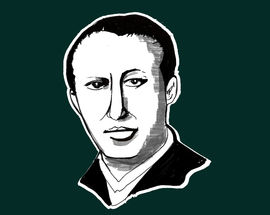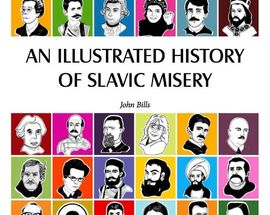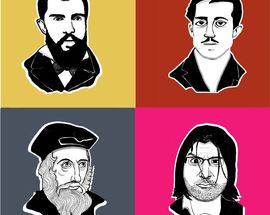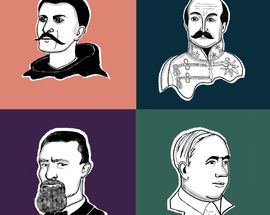The Name's Popov... Duško Popov
He was a handsome, rich, international playboy who was renowned for his love of threesomes, and if that doesn’t prick your interest I don’t know what will. The Nazis enlisted him as a spy in World War Two, but unbeknown to them he was providing them false information thanks to his position as a spy for Great Britain. He bedded movie stars, ran up humongous hotel bills and bluffed his way through the casinos. If this sounds like the plot for a movie then you aren’t wrong. This is the story of Duško Popov, one of the inspirations behind those James Bond films you may have heard of.Duško was born Dušan in the town of Titel (Serbia, hence this chapter) in 1912, but spent most of his childhood in the cultural surroundings of Dubrovnik. His family was wealthy, but a respectful manner was instilled in Duško from a young age. He left to study in Freiburg, Germany, where he quickly struck up a friendship with Johann-Nielson Jebsen. Germany was undergoing some radical changes in the 1930s, as economic misery and mass paranoia led to the rise of the Nazis. Being the confident fellow he was, Duško frequently took stands against the party, notably visiting a local café owned by a Jewish man on a number of occasions and making the brazen move of sitting in the front window. This didn’t go unnoticed by those in power (obviously), and the day after receiving his PhD Duško was arrested by the Gestapo and treated exactly as one would expect him to be. Badly.
His friend Jebsen, via a number of connections, intervened and Duško was released. He was given 24 hours to leave the country, and I doubt very much that he left his departure until the final hour. Duško soon found himself back in Dubrovnik, although one evening in 1940 he was instructed by his friend Jebsen to head immediately to Belgrade. It was here that he found out Jebsen had joined the Abwehr, the Nazi equivalent of the British Secret Service, and Duško was asked to join. He deliberated, but eventually relented and agreed. Almost immediately after making the decision, Duško headed to the British embassy to tell them of this development. Acting quickly, those crafty Brits signed Duško up as a double agent.
His cover was that of an owner of an import business between Yugoslavia and England, something that would justify frequent trips to London. The nature of spying generally means that nobody and nothing can ever be trusted, and Duško would very quickly get first-hand experience of this. He had employed his family driver Božidar to cart him around, but it quickly became apparent that Božidar was spying him. Old’ Bozo had to go, and two chaps made sure this was done as quickly and painlessly as possible, but having never been shot in the head, I don’t know how painful that is. Probably quick though.
Duško headed to Lisbon (Portugal), which was a veritable spy nest at the time. Portugal, along with Sweden, was neutral in the war, although in this instance neutrality basically meant Nazi-sympathetic. The Abwehr itself was a bit all over the place organisation-wise, representing a true cross-section of German society harbouring hardcore Nazis, resistance fighters, adventurers, bureaucrats and more within its ranks. Many were German patriots, but not all were Nazis. Duško’s officer in Lisbon was a man called Ludovico von Karstoff, but this obviously wasn’t his real name, because spies (that was Albrecht von Auenrode. Possibly). It was here that Popov began experimenting with spy gadgets, such as invisible ink. It really was Spy 101, like a trainee being given a book titled ‘How To Be A Spy’.
Popov had enjoyed the high stakes atmosphere of Lisbon, so when he journeyed to London in January of 1941 he couldn’t have entered a more different world. London was, to put it bluntly, bombed to dust, and British morale was at an all time low. This served as something of a boon for our Popov though, developing his convictions and desire to hurt the German war effort even further. Despite all the destruction and bad morale, Britain was still doing very well in the intelligence area, and Popov subsequently met with MI5 and MI6. He refused any and all payment from the British, stating that what he was getting from the Germans was more than enough to get by.
It wasn’t all work for Duško, in fact it seemed like he was barely working at all. He took his role as an international playboy very seriously, especially when it came to the ladies. He lived every day as if it was his last, which in the spy game is the only real way to go. In a world where distrust is the only real thing, every day actually could be your last. He was generous, organising big parties and picking up the bill, although this is a fairly common trait among Serbs. He was also fairly generous in the business of dirt, and it was his fondness for threesomes that brought about his codename - Tricycle.
Popov was a big hit at the casinos too, and it is here where many believe the James Bond story began. There was a particularly irritating Lithuanian partaking at the roulette table, who would place outlandishly large bets whenever he was banker, effectively pricing everyone else out of the game. Popov had had enough, and he calmly laid his bet - $50,000. To put this in perspective, this is about $1.4million in today’s dollar. The Lithuanian, duly shamed, wasn’t seen at the table again. Popov collected his money and left, clueless to the fact that Ian Fleming was watching the entire scene unfold. Reports suggesting he immediately began creating the James Bond character can neither be denied nor confirmed.
To say Popov was followed by success would be a misnomer however, and his experiences with the FBI in the United States would prove to be his biggest failure. Sent to the States by the Germans to gather information about their defences at Pearl Harbour, Popov instantly fell foul of Edgar J. Hoover, the head of the FBI at the time. Hoover hated double agents, he hated playboys and he hated foreigners, and it would come to no surprise should the file on Duško Popov have come with the subheading ‘Double agent, playboy, foreigner’.
Popov was followed everywhere, and as a spy he was fully aware of such. He famously remarked that whenever he bent over to smell a bowl of flowers, he would scratch his nose on a microphone. It took a long, long time for Popov to get a meeting with Hoover, so he kept himself entertained as he knew best, by making sweet, sweet love with celebrities and models. It was this that acted as the final straw for Hoover, as Popov would unwittingly commit a major felony by taking a girl over State lines for further promiscuity (known as The Mann Act). Popov’s eventual meeting with Hoover was a disaster too, ending in this famous exchange;
Hoover - ‘you want to teach me how to do my job?’
Popov - ‘no one will ever teach you anything’
Popov left, with nothing being gained. It is considered a great failure not because of this though, more because Popov informed Hoover (supposedly) that the Japanese were planning on attacking Pearl Harbour. Hoover completely dismissed this information, and we all know how that went down. On December 12 the attack came, 2500 American lives were lost and the United States lost control of the Pacific for a number of years. If Popov were to have been believed, all of this could have been avoided.
Upon his return to Europe, the tides were truly turning within the Abwehr. It had by this point been pretty much entirely purged, and was now run by extreme Nazis. This was fairly indicative of the evolution of the Nazi institutions, and they were falling apart. Popov had been able to inform the Brits that the Germans didn’t have enough soldiers to invade the island, and as the war dragged itself on, plans were put in place for what would become known as the D-Day landings, at Normandy. The war was all but over.
Of course, there was a whole lot more to it than this, but Popov’s work was done. He received the Order of the British Empire after the war, and moved to the South of France. His first marriage was brief, lasting only a year, but a year after that he was betrothed once again. This time the lucky lady was a 19-year-old Swedish girl (of course), and together they had three kids.
Before this, Popov had been given one last mission. He found out that his good friend Jonny Jebsen had died at Sachsenhausen Concentration Camp. Jebsen was also a double agent, and he had known all about the Normandy landings. Ironically, Jebsen was arrested and killed because the German authorities thought he was putting Popov at risk. Another theory is that he was kidnapped in order to preserve a plot to kill Hitler from within the secret police, a plot he would have gladly taken part in. Popov hunted the camp commander down, to gain a modicum of revenge. He found the man, but found himself unable to kill the fool, famously proclaiming ‘how can you put a bullet in a bag of shit?’ Fair point.
And there you have it. The Serbian playboy, who spoke five languages (not including the language of dirt) and left behind a trail of lovers and false information, arguably the most important agent on either side of the war and one of the inspirations for the James Bond character that came to define what we know as spy-fiction.
Just a reminder: the preceding was an excerpt from the book, An Illustrated History of Slavic Misery: The good and the great of Slavic history, dusted off and celebrated, which you can read more about here and here, and buy online here.









Comments